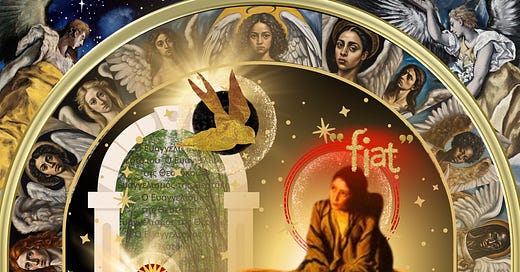Mary's yes, the miracle of consent, & the dignity of women, with a side note about original sin
"Lo how He scorns not the virgin's womb"
Content note: Though it does so obliquely, this piece treats the topic of sexual violence.
Gentle reader,
It’s the season of Mary’s pregnancy, of her rounded belly. How uncomfortable she must have been, riding on that donkey.
Imagine the day the angel of the LORD appeared to her and brought the terrifying good news: God wants her to be the mother of Jesus; her baby will be Emmanuel, God with us.
And Mary responds;
“Here am I, the servant of the Lord; let it be with me according to your word” (Luke 1:38).
We don’t hear this preached enough, but the Christian tradition has set great store by the fact that Mary said “yes.”1 Mary’s consent is a paradigm for faith, and God’s work in, with, and through her consent is a paradigm for how God works in our lives. And, yes, there are implications here for thinking about how God values women.
In the third part of his Summa, Question 30, Article 1, Thomas Aquinas asks:
“Whether it was necessary to announce to the Blessed Virgin that which was to be done in her?”
Aquinas’s imagined objector (his genre involves posing possible objections before responding to those objections) suggests the announcement was unnecessary because its “only” purpose seems to be “receiving the Virgin’s consent” (objection 1).
Ah, there it is, in that objection, the devaluing of Mary’s consent. And of yours and mine. Hear how it comes with the devaluing of her person. And of yours and mine. Hear the sin of patriarchy, the sin of hoarding power and using it for domination. Hear the cries of women, across the years, whose consent has been dismissed as nothing that matters.
Thomas’s delightful reply to the objection is a well placed proof text:
“You will conceive and give birth to a son, and you are to call him Jesus” (Luke 1:31)
He then offers four reasons that God acted so.
First, Mary’s “yes” to God is her faith in Christ.
Here, Thomas quotes Augustine:
“Augustine says (De Sancta Virgin. iii): ‘Mary is more blessed in receiving the faith of Christ, than in conceiving the flesh of Christ’…”
Luther would say much the same thing, as we’ll see at the end of this post.
Second, Mary’s “yes” makes her a “more certain witness of this mystery, being instructed therein by God.”
Mary’s “yes,” is a testimony, a sermon, a song, a martyrdom. True witness to the true God must come in freedom, in consent—or consensus—with the God who is Love.
Third, says Thomas, in her yes, we see the good in which Mary “might offer to God the free gift of her obedience.”
Ah now, hear how God values Mary’s person and how God values yours and mine. Feel how God cares for our agency. Know how God answers patriarchy with love. For the God of grace, free gift flows both ways: from God to us and from us to God.
Fourth and finally, Mary’s yes shows “a certain spiritual wedlock between the Son of God and human nature. Wherefore in the Annunciation the Virgin’s consent was besought in lieu of that of the entire human nature.”
Mary’s “yes,” is sacramental, signifying the way God works in human lives. In her “yes,” she stands for all of us—for human nature itself—and that makes her a priest. Mary is a witness to the priesthood of all believers created in her son’s priestly offering made for our sake.2
Praise to Jesus Christ, the One who dignifies our personhood, including the personhood of women, with his welcome and welcomed presence, becoming one of us.
The theology of this verse from “O Come all ye faithful” knocks me over every time.
True God of true God, Light from Light Eternal, Lo, he shuns not the Virgin's womb; Son of the Father, begotten not created, O Come let us adore Him, Christ the Lord.
A side note on original sin, the virgin birth, and sexuality, especially female sexuality:
Christian faith in the virgin birth is not about sexuality. It is certainly not a condemnation of sexuality or of sexual bodies or of women’s bodies.
He shuns not the Virgin’s womb.
Sin is not a sexually transmitted disease. The Doctrine of the Virgin birth is about WHO Jesus’s Father IS. It is about the identity of Mary’s baby, “Son of the Father, begotten not created.”
“Annunciation,” a collage icon by Beth Felker Jones.
My digital collage quotes Henry Ossawa Tanner’s “The Annunciation” (1898), the Ghent altarpiece (1432), El Greco angels (top left and right), and a number of angels from European art history (ranged along the bottom). The angels of diverse tribe, tongue, and nation spanning the archway were prompted “in the style of El Greco” using Canva’s AI image generator. Who can say which among them might be Gabriel, among the heavenly host?
In her “yes,” Mary walks through the door Jesus has opened.
If you’re interested in hi-res prints or postcards of the collage, without the watermark, hop over to my Redbubble store.
Martin Luther preaches to us from a Christmas 500 years past:
“The Virgin birth is a mere trifle for God; that God should become man is a greater miracle; but most amazing of all is that this maiden should credit the announcement that she, rather than some other virgin had been chosen to be the mother of God. … Had she not believed, she could not have conceived. She held fast to the word of the angel because she had become a new creature. Even so must we be transformed and renewed in heart from day to day.”3
May we welcome Jesus. May it be with us according to God’s Word. Fiat. Come, Lord Jesus.
Grace & peace,
BFJ
This piece contains associate links. As always, I’m grateful if you choose to subscribe, forward, or share. Want to support my work but can’t become a supporting subscriber? Buy me a coffee.
Get a 6 month trial of Amazon Prime for students.
Love learning about this stuff? Check out streaming video courses on theology, church history, biblical studies, and more at Seminary Now. See my course and others from leading authors and professors
For some good exegesis of the New Testament text here, see Beverly Roberts Gaventa, “‘Nothing Will Be Impossible with God’: Mary as the Mother of Believers,” in Mary, Mother of God, ed. Carl E. Braaten and Robert W. Jenson, (Grand Rapids: Eerdmans, 2004), 19-35, 19.
Thomas’s reply to the objection to Mary’s consent: “The prophecy of predestination is fulfilled without the causality of our will; not without its consent.” (Thanks, Thomas, for some good old compatibilism there.)
In Martin Luther’s Christmas Book, ed. Roland H. Bainton (Minneapolis: Augsburg, 1948), 15.











I love that collage.
I have heard that Mary lived in the same place where Jael wielded her tent peg and became a role model for young women there who hoped to be the next Jael. I wonder if she was somewhat prepared to assume that mantle, hearing the story and ready to accept her part in it?
The Martin Luther quote reminds me of this line from chapter 2 of my novel about Miryam (Mary):
"It occurred to me that I could say no to this astounding announcement, although I could not think of anyone who had said no to Adonai and truly lived afterward. I could say no and marry my husband, and surely Adonai could find someone else, someone much better, to mother his son. I could not be the best person for this task, I thought to myself. It was impossible."
Favored One: https://itsajennstore.etsy.com/listing/1452432773